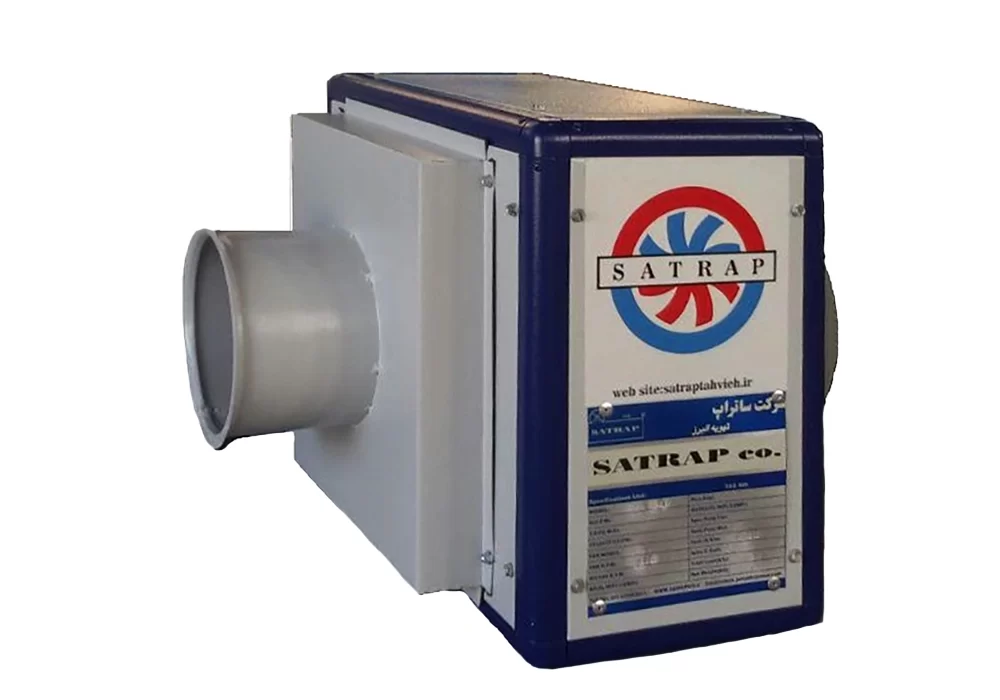Industrial Applications of Unit Heaters
A unit heater is a device that uses the heat energy of hot water or steam to heat the cold ambient air. This device has a high heating capacity and is used for heating large and wide spaces such as warehouses, factories, sports halls, and workshops.
Main components of a unit heater
- Heat exchanger: The heat exchanger is responsible for transferring heat energy from hot water or steam to the air. This exchanger is usually made of copper or aluminum.
- Fan: The fan is responsible for transferring cold ambient air through the heat exchanger and discharging hot air.
- Housing: The housing of the unit heater is made of sheet steel and protects the internal components of the device.
- Control panel: The control panel is responsible for adjusting the temperature and other operating parameters of the unit heater.
Types of unit heaters
Unit heaters are divided into two categories based on the type of heat exchanger:
- Hot water unit heater: In this type of unit heater, hot water is transferred to the heat exchanger through piping and transfers its heat energy to the air.
- Steam unit heater: In this type of unit heater, steam is transferred to the heat exchanger through piping and transfers its heat energy to the air.
Applications of unit heaters
Unit heaters have a wide range of applications in various industries. Some of the applications of unit heaters in industries include:
Heating of warehouses and factories
Warehouses and factories are usually large and wide spaces that require heating. Unit heaters are a suitable option for heating warehouses and factories because they have a high heating capacity. Unit heaters can quickly and evenly heat the air in warehouses and factories. This is of particular importance because warehouses and factories usually store equipment and goods that require a suitable temperature.
Unit heaters can also keep the air in warehouses and factories at a comfortable temperature for humans. This is important for people who work in warehouses and factories. They can also be used in various types of warehouses and factories, including industrial warehouses, production warehouses, sports warehouses, and storage warehouses. When choosing a suitable unit heater for heating warehouses and factories, various factors such as the required heating capacity, energy consumption, noise, and cost should be considered.
Heating of sports halls
Sports halls are usually large spaces that require heating. Unit heaters are a suitable option for heating sports halls because they have a high heating capacity and can quickly and evenly heat the air in sports halls.
Unit heaters are used in sports halls in two ways:
- Direct heating: In this method, the cold ambient air is heated through the heat exchanger of the unit heater and then transferred into the sports hall.
- Indirect heating: In this method, the hot air is transferred into the sports hall through ductwork.
The choice of heating method for a sports hall depends on various factors such as the type of sports hall, the required heating capacity, and the allocated budget.
In sports halls where athletes are active professionally, direct heating is usually used. This method allows the sports hall to heat up quickly, and athletes can easily and without any problems.
In sports halls where athletes are active non-professionally, indirect heating is usually used. This method allows the air in the sports hall to be heated evenly, and athletes feel more comfortable. When choosing a suitable unit heater for heating sports halls, various factors such as the required heating capacity, energy consumption, noise, and cost should be considered.
Heating of greenhouses
Greenhouses are spaces used for growing and cultivating plants in a controlled environment. These spaces usually require heating in the cold seasons of the year to keep their temperature within the desired range for plant growth.
Unit heaters are one of the common methods for heating greenhouses. These devices have a high heating capacity and can quickly and evenly heat the greenhouse air. They also have low energy consumption and are easy to install and operate.
Conclusion
Overall, unit heaters are efficient and cost-effective heating devices that have a wide range of applications in various industries. These devices have a high heating capacity and can quickly and evenly heat large spaces. They also have low energy consumption and are easy to install and operate. However, they may produce a lot of noise and require hot water or steam piping.

